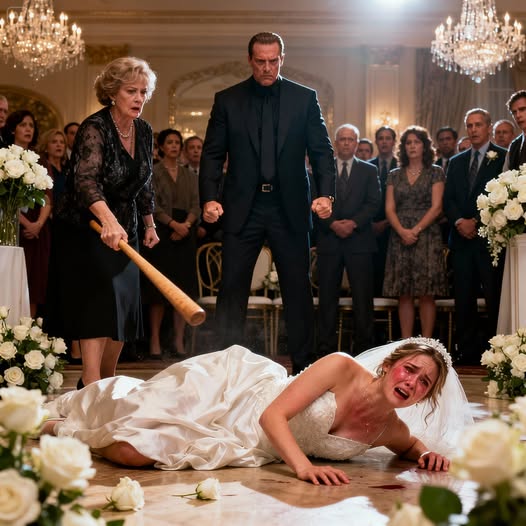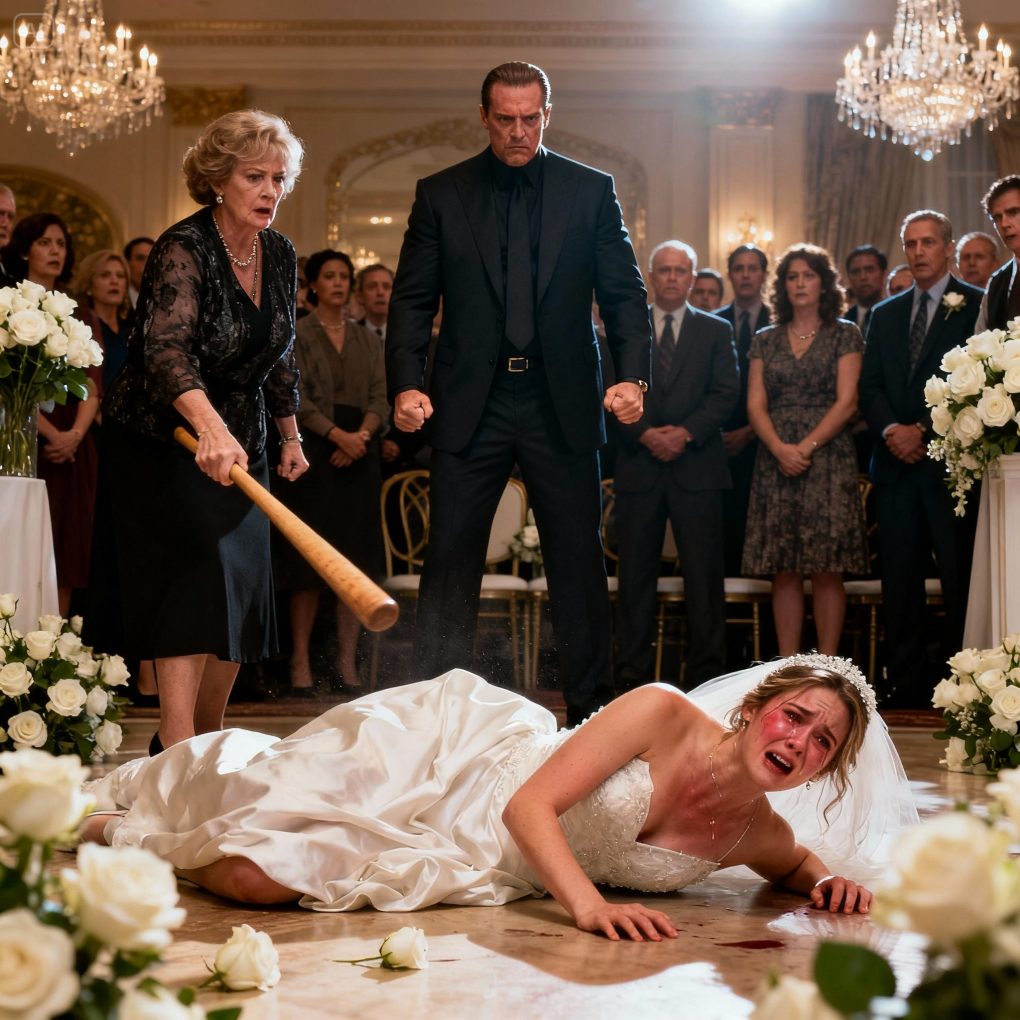The Ceremony That Began Like a Fairy Tale
It was meant to be the happiest day of her life.
The marble hall was glowing with golden light; violins played softly as petals fell from the ceiling like snow. Guests whispered blessings, photographers clicked endlessly, and the bride — Elena Romano, 26 — looked radiant in white lace and trembling joy.
Her groom, Marco DeLuca, was smiling proudly beside her, his family seated in the front row — elegant, powerful, traditional.
Elena’s family filled the opposite side, simpler but warm, bound together by the quiet confidence of her father, Vittorio Romano, a man known for his charm, his tailored suits… and the rumors that whispered behind him: “He runs things no one talks about.”
No one imagined the day would end in shattered glass, a broken bouquet, and a silence so heavy it felt like judgment.
The Demand
It happened between the vows and the dance.
When the newlyweds stepped aside to greet guests, Marco’s mother, Signora Teresa DeLuca, pulled Elena into the anteroom behind the altar — away from the cameras, away from smiles.
Her perfume filled the room before her words did.

Elena blinked. “Where is what, Signora?”
Elena froze. She had already told Marco the truth — there was no dowry. Her father refused. “I’m marrying you,” he’d said, “not buying them.”
But Teresa wasn’t listening. Her eyes narrowed to slits. “Don’t insult my family. You will hand it over — tonight.”
“No,” Elena whispered. “My father said he’d rather die than—”
The slap came first.
The stick came next.
Teresa grabbed the ceremonial cane she used for walking and struck Elena across the arm — once, twice — shouting words that cut deeper than wood.
The sound of impact echoed through the marble hallway. Then silence — and a soft gasp from the doorway.
It was Vittorio Romano.
The Father Who Saw Everything
He didn’t shout.
Didn’t move.
He simply stood there, his eyes fixed on the stick, on his daughter’s trembling hands, on the bruise already blooming beneath the silk sleeve.
Then he looked at Teresa.
Those who were there later said his expression changed so subtly it was terrifying — calm, polite, but colder than glass.
“Signora,” he said quietly, “you’ve made a mistake.”
“She defied me!” Teresa hissed. “A wife who doesn’t honor tradition—”
“Ah,” Vittorio interrupted, “tradition. A fine word for cruelty.”
He stepped closer until the air itself seemed to tighten.
“You raised a son to love, and a heart to hate. You struck my blood. I suggest you pray that’s the last thing you strike in this lifetime.”
Then he turned to his daughter and, without raising his voice, said:
“Come, Elena. The wedding’s over.”
But the story wasn’t.
The Aftermath
The celebration halted within an hour. Guests left whispering, the music fell silent, and the DeLuca family closed ranks. Marco tried to apologize, torn between the woman he loved and the mother who ruled his world.
Elena sat in her father’s car, veil trembling like smoke. “Papa,” she said softly, “don’t do anything foolish.”
“Foolish?” Vittorio smiled without warmth. “No, figlia mia. Foolish is hitting a man’s daughter on her wedding day and thinking there won’t be a reckoning.”
She grasped his hand. “Promise me you won’t hurt her.”
He didn’t answer.
Outside, rain began to fall.
The Visit
Three days later, Teresa’s family villa on the Amalfi Coast was surrounded — not by police, but by silence. No bodyguards, no staff, no phone lines working. Only a black car parked at the gate.
Vittorio stepped out alone, holding a single white lily — the kind used at funerals and weddings alike.
The butler tried to stop him. He simply said:
“Tell her the bride’s father has come to deliver her gift.”
Inside, Teresa waited in her drawing room, her pride unbroken, though her hands trembled. “If you came to threaten me—”
“No,” Vittorio said, placing the lily on the table. “I came to teach you something.”
He nodded toward the window, where workers were unloading crates marked with her family’s crest. Gold. Jewels. The kind of wealth that built empires.
“This,” he said, “is your dowry. Paid in full. From me. But every coin will go to the orphanage your husband once stole land from. That’s the cost of forgiveness.”
Teresa’s face went pale. “You can’t—”
“I already have,” he said softly. “Consider it a gift — from one sinner to another.”
Then he turned to leave. At the door, he paused.
“And Teresa,” he added. “If you ever raise a hand to my daughter again, it won’t be lilies I bring next time.”
The Town Talks
In the weeks that followed, the story spread across Naples like wildfire. Some said the infamous Romano family had “bought mercy.” Others said Vittorio had redeemed his sins by turning vengeance into justice.
Elena and Marco quietly left Italy for Madrid, starting over far from both families. Their marriage, fragile as porcelain, survived — barely.
A reporter once asked Elena if she ever forgave her mother-in-law.
She thought for a long time before answering.
“Forgiveness isn’t about pretending it didn’t happen. It’s about refusing to pass it on. My father taught me that.”
The Letter No One Expected
A year later, on their first anniversary, a letter arrived at their apartment in Madrid. No signature, no return address — only a crimson wax seal shaped like a lily.
Inside was a single page, written in elegant cursive.
“I have given the rest of my jewelry to the orphanage.
Your father was right. Pride poisons the heart before age poisons the body.
I hope one day you’ll visit — not as a daughter-in-law, but as forgiveness itself.
— T.”


